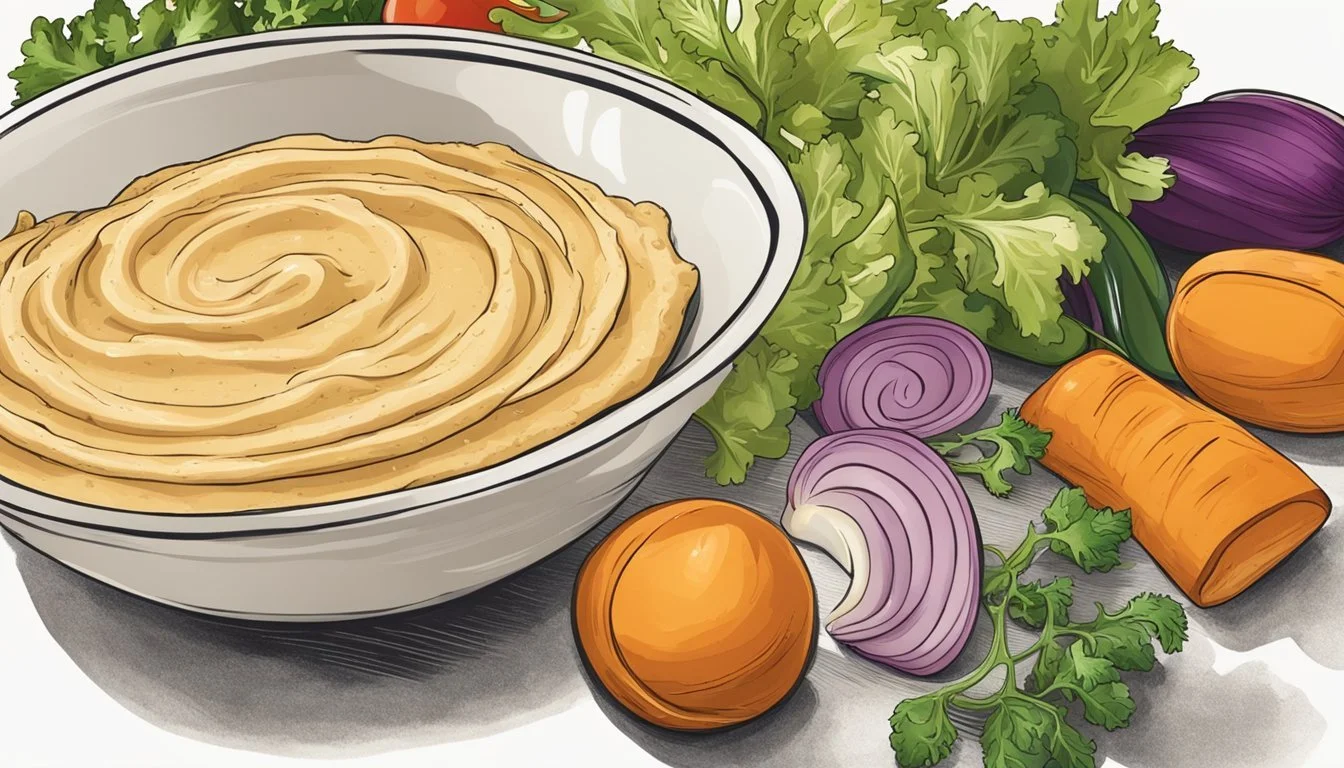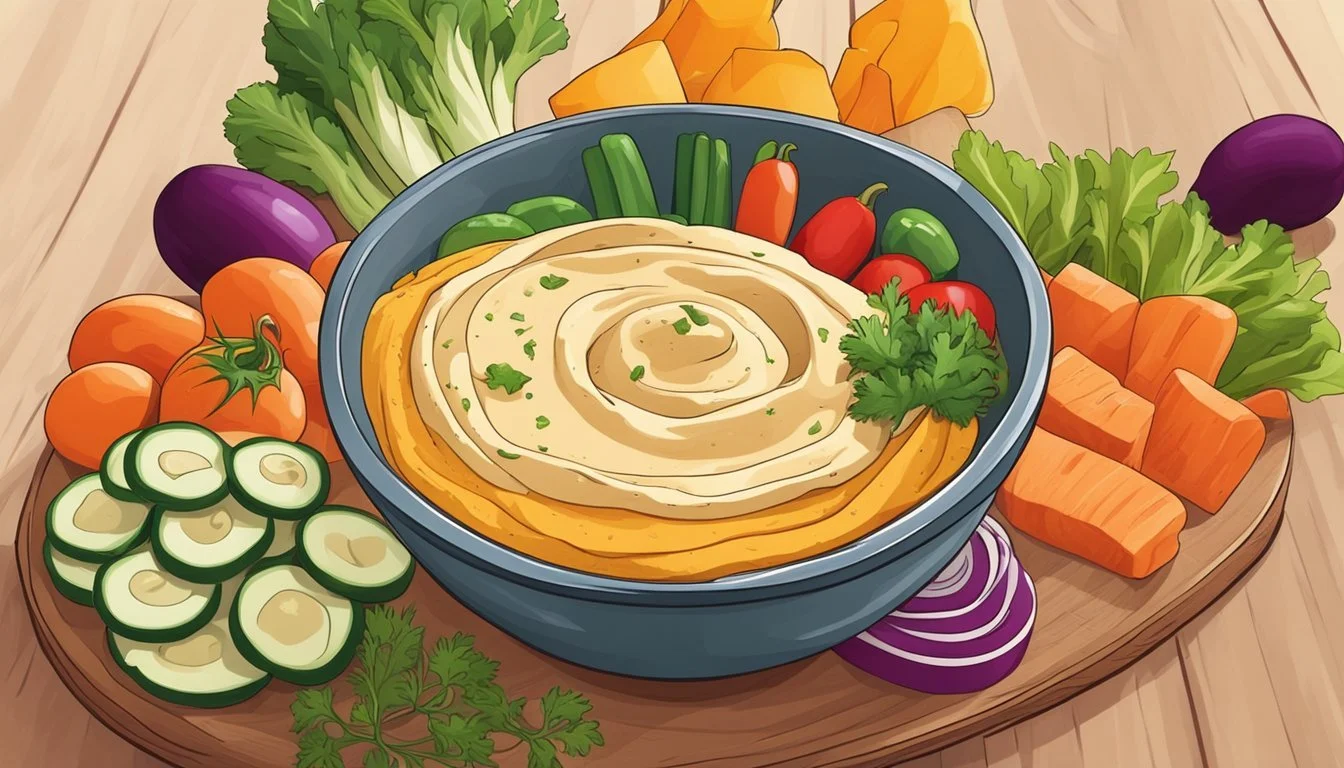Does Hummus Go Bad?
Understanding Shelf Life and Storage Tips
Hummus, a popular dip made primarily from chickpeas, tahini, olive oil, lemon juice, and garlic, is a staple in many households due to its flavorful profile and versatility. Like all food products, hummus is subject to spoilage, and its shelf life can vary based on several factors. It's critical for consumers to understand how to determine whether their hummus is still good to eat or if it has gone bad.
Store-bought hummus and homemade hummus differ in their longevity. Commercially prepared hummus often contains preservatives that extend its shelf life, allowing it to be stored for longer periods. Once opened, it's generally safe to consume within a week if kept refrigerated. In contrast, homemade hummus lacks these preservatives and usually has a shorter shelf life of around three to four days in the fridge.
To assess the quality of hummus, sensory evaluation is key. Fresh hummus should not have a noticeable smell and should maintain its original taste profile. If the hummus emits a sour odor or has an off taste, it could be an indication of spoilage. Additionally, visible mold or a change in texture may also signal that the hummus is no longer safe to consume. As a precaution, if there is any doubt about the freshness of hummus, it is best to discard it to avoid potential foodborne illness.
Understanding Hummus
Hummus is a popular dish with a rich tradition rooted in Middle Eastern cuisine, celebrated for its versatility and nutritional profile.
What Is Hummus
Hummus is a spread or dip traditionally made from chickpeas as the primary ingredient. This creamy mixture is often enhanced with tahini (sesame paste), lemon juice, garlic, and olive oil. These components are blended together to create a smooth, rich paste that is beloved in various cuisines around the world. The combination of ingredients not only confers a unique taste but also contributes to hummus being considered a healthy option.
Ingredients And Variations
Chickpeas: The star ingredient, providing a smooth texture and a good source of protein, fiber, vitamins, and minerals, including iron.
Tahini: Sesame seeds ground into a paste, tahini adds a nutty flavor and creamy consistency.
Garlic: Amounts can vary, adding a zesty kick and depth of flavor.
Lemon Juice: It imbues the dish with brightness and a slight tang.
Olive Oil: Used to enrich the texture and infuse the dip with healthy fats.
Variations of hummus often incorporate additional flavors such as roasted red peppers, sun-dried tomatoes, or herbs like parsley and cilantro. These variations follow the basics of traditional hummus while introducing new taste profiles.
Shelf Life And Storage
The stability and freshness of hummus are influenced by several factors including whether it is store-bought or homemade, how it is stored, and whether it has been frozen. Proper storage methods are essential in extending the shelf life of hummus.
Store-Bought vs. Homemade Hummus
Homemade hummus typically does not contain preservatives and therefore, should be consumed within 3-4 days of preparation. Store-bought hummus, on the other hand, often includes preservatives that extend its shelf life. Unopened, it can last for 2-4 weeks when refrigerated, while opened containers should be used within 4-7 days to ensure freshness.
Refrigerator vs. Pantry Storage
Once opened, hummus should be kept in an airtight container in the refrigerator. Refrigerated hummus maintains its quality for the time frames mentioned above. Storing hummus at room temperature is not advisable, as it can spoil quickly due to the presence of perishable ingredients.
Freezing And Thawing Hummus
To freeze hummus, one must ensure it’s placed in an airtight container to prevent freezer burn. When ready to use, thaw it in the refrigerator overnight. Freezing may affect the texture, but it remains a viable option for extending shelf life for up to six months.
Signs Of Spoilage
The texture and smell of hummus can signal spoilage. Changes in color, presence of mold, or an off smell are indications that the hummus should not be consumed. Always inspect the hummus before eating to avoid health risks associated with spoiled food.
Food Safety Concerns
When it comes to hummus, an array of factors can influence its safety for consumption, including the potential for spoilage and the growth of harmful bacteria. Ensuring food safety involves recognizing the signs of spoilage and adopting healthy consumption practices.
Spoilage And Foodborne Illness
Spoilage is a critical sign that hummus is no longer safe to eat. The presence of mold growth on the surface is one of the most noticeable indicators. Mold can introduce harmful bacteria that may lead to foodborne illnesses. Bacteria such as Salmonella or other contaminants could also proliferate if hummus is not stored properly. Another sign of spoilage is an off smell, which suggests that harmful bacteria growth has started to affect the product. Consuming spoiled hummus can result in food poisoning.
Healthy Consumption Practices
Consuming hummus safely largely depends on healthy consumption practices. Hummus is a perishable food item and should be refrigerated promptly after purchase or preparation. To minimize contamination risks, one should use clean utensils when serving and avoid leaving hummus at room temperature for prolonged periods. Expiration dates must be respected, and any hummus that has surpassed this date or shows signs of spoilage should be discarded. Preventing cross-contamination is also crucial; for instance, ensuring that raw foods that may harbor bacteria do not come into contact with ready-to-eat hummus.
Maximizing Hummus Quality
To maintain the highest quality of hummus, one must adhere to proper storage methods and optimize the use of leftovers. Fresh ingredients and careful handling play a crucial role in ensuring the hummus remains a healthy and delicious dip.
Best Practices For Freshness
Purchase or Prepare with Fresh Ingredients: The use of fresh ingredients is pivotal in creating hummus of superior quality. One should select the freshest chickpeas, tahini, and produce.
Storage: Always refrigerate hummus in an airtight container to retain its consistency and quality. For store-bought hummus, follow the 'use by' dates, whereas homemade hummus typically lasts 3-5 days in the fridge.
Freezing: To extend shelf-life beyond refrigeration, hummus can be frozen. Freeze in small portions and thaw in the refrigerator overnight when ready to consume.
Utilizing Leftovers
Versatile Recipes: Hummus is versatile. Leftovers can be incorporated into various recipes such as salad dressings, spreads for sandwiches, or as a base for savory sauces.
Freezing Tips:
Before freezing, divide it into ice cube trays. Once frozen, transfer to a freezer bag.
Label the bag with the date to ensure usage within optimal time frames (up to four months for best quality).
By closely following these tips and paying attention to the specifics of freshness and storage, the hummus's consistency, taste, and nutritious value can be preserved effectively.
Pairing And Serving Suggestions
Hummus is often enjoyed for its creamy texture and versatility. Whether one is prepping a snack or complementing a meal, pairing hummus with the right foods can enhance its flavors and provide a satisfying culinary experience.
Hummus As a Staple in Diets
Hummus has its origins in the Middle East and has become a staple in diets around the world. It's appreciated not only for its distinctive taste but also for its nutritional value. Traditional hummus is made with chickpeas, tahini, lemon juice, and garlic, resulting in a blend that is rich in protein and fiber. Its creamy consistency and subtle, earthy flavors make it a cool and inviting dip.
Complementary Foods
For those looking to enjoy hummus, a variety of complementary foods can elevate the experience:
Breads:
Pita Bread: A classic option that offers a soft texture and a mild flavor that doesn't overpower the hummus.
Bagel Chips: For a crunchier texture, bagel chips are an excellent choice.
Veggies:
Colors and Flavors: Brightly colored vegetables not only add visual appeal to the dish but also various tastes and textures. Bell peppers, carrot sticks, celery sticks, and radish slices are some favorites.
Salad: Adding hummus to a salad can provide an extra layer of flavor and creaminess.
Chips and Crackers:
Tortilla Chips: Their sturdy structure is perfect for scooping up generous amounts of hummus.
Crackers: Options like wheat thins and rice crackers can complement the dip without overshadowing its flavor.
The key to pairing hummus is balancing the flavors and textures. Spices and garnishes like olive oil, paprika, or cumin can be added to hummus to match one's preference for spice and aroma.
Product Lifecycle And Purchase Tips
When purchasing hummus, one should pay close attention to its expiration date to maximize freshness and minimize waste. Understanding the product lifecycle of hummus can lead to informed decisions at the point of purchase and beyond.
Buying And Exploiting The Expiration Date
When in grocery stores, customers should look for the best-before or use-by date printed on the packaging of hummus. These dates are indicators of the product's peak quality as determined by the manufacturer. To ensure the selection of the freshest hummus, one could:
Check the date: Aim to select a container with the furthest-in-the-future best-before or use-by date.
Inspect the seal: Choose containers with an intact seal to prolong freshness.
Consult store staff: Ask employees if fresher stock is available if the available dates are near.
A frequently asked question (FAQ) is whether hummus can be consumed past its best-before date. Hummus might still be acceptable for a short period beyond this date, but the taste, texture, and safety could be compromised.
Dealing With Expired Hummus
When consumers encounter expired hummus, they should assess its condition before consumption. One should:
Inspect for spoilage: Look for signs of mold, off smell or color changes.
Consider the storage: If the hummus has been consistently refrigerated, it might remain consumable for a limited time past the expiration date.
However, if there is any doubt about the safety of the hummus, it is advisable to err on the side of caution and dispose of the product. Expired hummus carries a risk of foodborne illness and should not be ingested.





